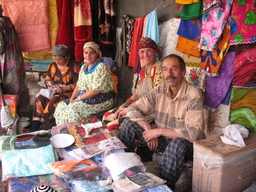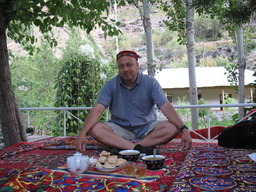
Khorog Bazaar
 Khorog Bazaar |
We heard people singing when we returned to the hotel last night. It was beautiful. Friederike and I paused at the gate to listen. There was some sort of gathering at a complex across the grounds.
We hadn't realized that the town's main jamaat-khana was right next door to the hotel where we were staying. We happened to return just as a nightly service was finishing up. As people began filtering out we caught a few to ask them what it was all about. Three local teenagers who could speak fair English explained some of the basics about the Ismailis.
Before this trip I knew very little about the Ismailis. I knew that they were Muslims--but a splinter sect following different traditions. I knew that their leader was the Aga Khan. I knew that they didn't have mosques and that they didn't fast during Ramadan. That was about all I knew.
The teenager who could speak the best English--who gave her name as "Sabrina"--elaborated on the location:
"The jamaat-khana is our gathering place. This is where we come every night for our service. My friends and I volunteer to help with the setup. Would you like to come tomorrow? We meet every night at 8:00 P.M.".
Friederike and I made a point to return to the hotel early to attend this evening's service.
I seldom attend prayer services of any religion. I often do visit mosques while on the road, but do so almost exclusively as a tourist to gawk at the architecture and calligraphy. Even with my lack of experience, I could feel something different about the gathering at the jamaat-khana. The aspect that stood out first in my mind was that at least two-thirds of those in attendance were women. Every other time I've happened by a mosque at prayer time there are hundreds of beards, mustaches, and skullcaps. This was the first time I found those features in the minority, dominated rather by headscarves and kerchiefs.
There was nothing fancy to the gathering hall. It was a simple outdoor area with a covered stage facing an open area. Gatherers knelt in parallel rows. The only calligraphy was a rough sign in the Arabic script reading "Dar-ul-nur". I liked the simplicity and equal access of the place. Many of the mosques I have visited keep separate entrances and sections for female worshippers. In some countries--such as Turkey--I've seen this as a small curtained-off area in the back of the main prayer hall. In other areas I have visited--such as across Xinjiang--women aren't allowed to attend prayers at mosques at all.
Here, women not only formed the majority, but weren't relegated to the back: they knelt along the very rows with the men who had come that night. There was still a separation: women ran along the left side of each row, men along the right. But proximity to the stage was equal for both.
Friedrike and I found places at the far right end of the back row. Much of the service was conducted in standard Arabic and Tajik--languages different to those spoken in this area of the Pamir mountains. I could pick out so many of the words from both, but couldn't grasp the overall meaning. Singing and chanting were interspersed throughout the service. Nobody on stage was female, but at one point a woman did take over the microphone. She gave a beautiful reading aloud in Arabic: her cadence was perfect. At one point there was a familiar ritual I've often seen in services of other religions: an acknowledgment of the persons kneeling to either side by offering up the sign of peace. Men shook hands; women kissed--whether it was each other's cheeks or hands they kissed, I couldn't tell.
I tried my best to mimic the motions of others in attendance as they were carried out. I found that it's been too many years since I've had to fold my legs and kneel down. I couldn't squat my haunches anywhere near my heels so tried sitting cross-legged. Sitting in that position made prostrating difficult the times everybody else bowed down. It felt as if every muscle about my legs and feet was cramping up.
 Dinner before Service |
After the cloth had been completely rolled up I staggered over to the area where we had come in. Both of my legs had fallen asleep; I sat down on a bench just off the prayer hall and allowed myself about ten minutes for the blood to re-circulate. We again ran into the same group of teenagers and chatted. Everybody seemed so happy that we had come to attend their service.
I've met many kind, welcoming, hospitable Muslims in my travels. But I have to say... if there is ever a competition as to which sect deserves the title of "most chilled-out", my vote will have to go to the Ismailis.